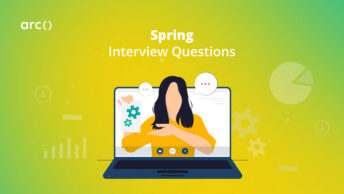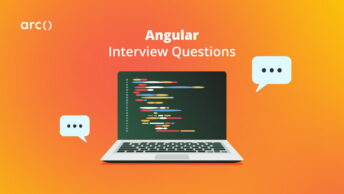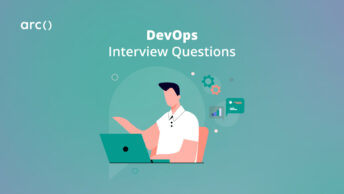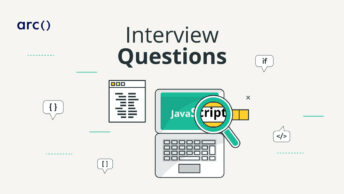A developer interview can be nerve-wracking. But, don’t let that get in the way of you asking the interviewer strategic questions that can uncover essential details about the job.
Asking questions during an interview, when done right, is a great way to showcase your skills, personality, and what you value in an employer. This can help you stand out among the sea of software development candidates and leave a solid, lasting impression.
In this deep-dive article, we’ll cover a variety of questions to ask the interviewer, from inquiries about the job and company to technical questions and beyond.
Looking to hire the best remote developers? Arc can help you:
⚡️ Get instant candidate matches without searching
⚡️ Identify top applicants from our network of 350,000+
⚡️ Hire 4x faster with vetted candidates (qualified and interview-ready)
Try Arc to hire top developers now →
One Important Question to Always Ask at Interviews
Before we get to the various types of questions to consider, there is one question that should always get asked for each position and employment process you’re involved in:
Why is this job open?
David Roberts, Arc’s Head of Developer Relations, says that inquiring about the reason for the position opening is his go-to question, for several reasons:
My favorite question to ask during an interview is: "Why is this job open?" The brilliance of this question is that it can completely change the course of an interview if you ask it at the right time. You ask questions at the end, right? Well, how about you ask this one at the start? If you listen to the answer, the interviewer will tell you how to frame all of your subsequent answers. If they are behind schedule, you are the developer who is skilled at delivering projects on time and getting back on schedule. If they are missing a skill in the team, you highlight that skill in every answer you provide. The interviewer is telling you their pain, and now you can fix it! The second benefit to this question is that, as it is asked earlier in the process, it can change the interview from what feels like an interrogation into an actual, two-way conversation. This builds a relationship and sets you apart from most of the other candidates.
So, don’t wait until the end when they ask “Do you have any questions for me?” Hit them with this one at the beginning to set the tone for the rest of the interview!
Now, let’s continue with the best questions to ask to demonstrate your technical knowledge as a software developer.
Interview Questions to Ask Showing Your Tech Skills
As a software developer, the most important questions to ask in an interview are ones that demonstrate your tech skills. They also let you uncover what technology you’ll be working with and whether that fits your interests and aspirations as a software developer.
What programming languages, frameworks, and libraries do you use?
When asking this question, pay attention to the answers and ask follow-up questions. For example, if the programming languages being used are unusual for that industry or type of application, ask the interviewer why it was chosen. This shows you understand the use cases for different programming languages and are curious about the company’s approach to software.
Keep an eye out for legacy applications. You may choose to avoid working on them if you’re specifically focused on modern technology.
What kind of databases do you use and where is the data stored?
You’ll want to find out whether the databases are SQL, NoSQL, or a combination. This will give you an idea of what the company’s different data sets are like. Data in an SQL database is very structured, while the data in a NoSQL database is less structured and doesn’t require a predefined schema.
Once you’ve found out what types of databases are being used, ask how the data is stored. Is it on-site, off-site, on the cloud, or a combination? If data is stored on the cloud, ask whether they use Amazon Web Services, Microsoft Azure, or a different cloud computing service. Make sure to brush up on how each one works so you can speak to that and ask follow-up questions where necessary.
If you have more experience with a certain type of database or cloud platform, this is a good time to highlight that.
What source control do you use?
Asking the hiring manager how source control is handled shows you have standards as a software developer and value a reliable workflow for code changes.
It’ll also help you gauge how mature the company’s software development organization is. More mature software development organizations tend to have a strict branching model with rules and restrictions to prevent bad merges.
If it’s a less mature software development organization, ask if there are plans to incorporate source control. Or maybe it’s something you can help implement if you get hired. But generally, no source control whatsoever is a red flag.
Where is your tech debt and are you doing anything to address it?
Teams and organizations define tech debt differently. If you get the chance, ask the CTO or tech lead how they define technical debt. For example, is architectural work considered tech debt?
Then ask where the tech debt is. Is it mainly in a legacy application that’s being phased out or is it piling up with new features?
If tech debt is a result of net new development, then you’ll need to dig into why that’s happening. It could be any of the following:
- No source control
- Not using a specific feature branch when developing new features
- No automated tests
- Use of shortcuts in development
- No programming standards
- Architecture isn’t modularized enough
- Product management doesn’t prioritize fixing tech debt
Companies may not like to talk about their tech debt, but it’s critical for you to gain this valuable information. It could impact whether you want to work in the role or not.
Read More: 8 Common Mistakes to Avoid at Interviews for Software Developer Jobs
You can also explore HireAI to skip the line and:
⚡️ Get instant candidate matches without searching
⚡️ Identify top applicants from our network of 350,000+ with no manual screening
⚡️ Hire 4x faster with vetted candidates (qualified and interview-ready)
Try HireAI and hire top developers now →
Questions to Ask About the Role & Day-to-Day Activities
These are the second most important set of questions to ask during an interview because the answers will dictate how you’ll spend most of your days in the role.
How big is the team and what does it look like?
If it’s a bigger team, your role will likely be more specialized. And you may have supporting roles like:
- Technical leads
- Data engineers
- Quality assurance analysts
- Testers
- DevOps engineers
- Designers
These roles assist the software developer in doing their job. For example, testers tend to write automated tests and scripts so the software developer only has to focus on unit testing.
If it’s a smaller team, your role may encompass more responsibilities like infrastructure design or deployment support.
Get a clear picture of the team’s size and composition so you can decide whether it’s the right opportunity for you.
How many regular meetings do software engineers attend?
If you’re the type of software engineer who needs long periods of deep work, this question is for you. Find out how many days of the week you’re required to attend meetings.
This question is also useful for understanding what teams you’d be interacting with on a regular basis. Ask the hiring manager what members of other teams are present during the meetings and what the agenda usually is.
What software development process do you use?
The most popular software development processes are agile, Scrum, waterfall, or a hybrid model. Most companies use a hybrid model so it’s important to understand the details as it’ll dramatically impact your day-to-day experience.
Here are some details to inquire about:
- Estimation of development work — Who is involved and is work estimated using hours or T-shirt sizing? How are disagreements on estimates handled?
- Code reviews — How are code reviews done and who does them? What kind of feedback is given during code reviews?
- Code changes — Can the application be tested locally? How soon does code in the repository get deployed to production?
- Deployment — How frequent are deployments to different environments? Is there continuous deployment?
- Process changes — How has the software development process changed over the past year? What challenges is the team currently facing?
These additional details will give you a good sense of the engineering culture, the quality of the code, and how open to feedback the team is.
Read More: 10+ Tips for Preparing for a Remote Developer Video Interview

What to Ask About Management & Leadership at an Interview
A company’s management style has a huge impact on how decisions are made and how performance is measured. You need to ask these questions about the team during your software development interview to learn about the management style and what it’s like to work under it.
Where does Development sit in the organization?
Is Development its own department or does it fall under another department? This will tell you how much pull Development may have within the company.
What is encompassed under Development? Does it include the quality assurance team or data team? You’ll likely be working closely with the different roles within the Development department.
How are projects planned and prioritized?
Ask the hiring manager how the last few projects were prioritized and at what point Development was brought in for planning.
In some companies, software developers are simply told what to build and aren’t included in the planning phase. But in other companies, software developers have a say in what projects are prioritized. This means they have the power to actively prioritize tech debt or architectural changes that can speed up future development.
This could be a good time during a software developer interview to also ask how engineering and design decisions have been made in the past. How was conflict handled? Did the engineering lead make the final decision or was there a team vote?
How do management and leadership measure success?
Here you’ll want to ask what metrics are tracked for software developers and what the most important metric is. Is it the speed of development or the number of features rolled out? These are certainly good metrics to track but they don’t take into account the quality of the code or the outcome for the end-user.
A better measure of success would be the defect escape rate, which measures the number of defects that made it to production. Prioritizing a metric like this suggests that management and leadership care about code quality and the stability of the application.
When was the last experiment run and how was it handled by management and leadership?
Ask the hiring manager when the last time was that the team experimented with a new programming language, framework, or technology. Find out how the experiment came about and what the outcome was. Was it a success or a failure?
If the experiment wasn’t successful, what was management’s reaction? Did the negative outcome of that experiment impact leadership’s appetite for future experimentation? Why was that?
Experimentation is necessary for there to be technical breakthroughs. It’s also a way for software developers to unleash their curiosity and hone their craft.
Steer clear of development organizations that frown upon failed experiments and don’t foster a culture of trying new approaches to development.
Do any of the managers actively program themselves?
This question will give you insights into how hands-on managers are and what kind of support they’ll be able to give you with respect to the details of programming.
If managers are the ones doing code reviews, it’s important for them to be involved in the code on a regular basis. Otherwise, the code reviews may not be that accurate or helpful.
Read More: 8 Behavioral Interview Questions Asked by Top Tech Companies
Questions Showing Your People Skills, Communication Skills & Personality
Now it’s time to ask the interviewer some questions to show that you have people skills and can communicate effectively both within your department and outside of it. It’s also a chance to show off your personality!
How much do software developers interact with other departments?
Asking this question shows you’re interested in the interpersonal and cross-functional aspects of the job, not just the programming side of it. Employers often look for software developers who are good communicators and are able to easily collaborate with different departments. This is especially true on remote teams!
Depending on what the answer is, you may want to dig deeper. For example, if the role interacts a lot with other teams, is it because of company culture or a lack of organized communication? Alternatively, if the role doesn’t interact much with other teams, is it because software developers are given a lot of time for deep work or they’re simply too isolated?
How do you currently support or mentor junior software developers?
If you’re a junior software developer yourself, this question is important because it demonstrates that you value mentorship and a supportive developer environment. Getting support as a junior software developer will be integral to your professional growth.
Here are some follow-up culture questions you can ask the interviewer:
- What does training look like for a junior software developer?
- What initial tasks are junior software developers given?
- How soon do junior software developers push changes to production?
- Is there ongoing mentorship for junior software developers?
If you’re an intermediate or senior software developer, this is a smart question to ask that will show your enthusiasm for bettering the software development practices at the company. Employers often look for senior software developers who are able to add to the development culture at the company.
How did you join the company and what keeps you here?
This is definitely one of the best questions to ask in final interview situations, but feel free to pose this query earlier.
Ask the hiring manager about their story of why they joined the company and what keeps them there over the years. It’ll show you’re interested in the people who work at the company and what makes them tick.
It can also spark up a conversation about how the company has changed (hopefully, for the better) since the hiring manager has been there. Listen carefully as they talk about their experience at the company. Although they likely won’t talk directly about any negative aspects of the company, you may be able to pick up on subtle cues.
Read More: Software Engineer Interview Questions, Answers & Tips for Every Tech Stack

Arc is the best place to find great remote jobs. Find great remote jobs at top startups and tech companies. Freelance and full-time remote opportunities are available.
Sign up here
Questions to Ask at Interviews to Show Interest and Passion
While your technical skills are obviously important, employers also want to know that you truly care about the work and will be motivated even when times get tough.
Here are some great questions to ask after an interview:
Have you ever run a hackathon?
A hackathon is a short event, either a few days or a week, where software developers get together to collaborate on ‘hacking’ a software project together.
Companies that run hackathons are great because they care about engineering culture and strive to give developers the freedom to try new things. It’s even better when those hackathon projects have the chance to inspire actual features of the company’s product. Ask for examples of features that were the result of a hackathon challenge.
Do software developers regularly attend conferences or meetups?
Ask the hiring manager how many software developers on the team frequently attend conferences or meetups and whether they share their learnings with the team later. This will show your interest in continuously improving your software developer skills.
Make sure to have a shortlist of conferences or meetups you’d want to attend handy in case the interviewer asks you.
Read More: 8 Questions to Ask Recruiters Before Committing to the Dev Hiring Process
Questions Showing Your Interest in the Company
When interviewing for a software developer position, you absolutely need to show interest in the company. Otherwise, all else being equal, why should they hire you over someone else? Here’s a set of company questions to ask the hiring manager.
How do customers benefit from your product and what’s your biggest differentiator?
Even as a software developer, it’s important for you to know how customers use the company’s product and what sets it apart in the market. Asking this question will demonstrate that you care about the company’s overall business model, not just the technology.
Employers value software developers who are curious about the business side of things. They tend to be able to build better software because of a deeper understanding of the company’s product and the value it brings.
What’s the company’s biggest priority right now?
Ask the interviewer what the company is working toward right now and how your role would support hitting those goals. This will help you understand how your role fits into the bigger picture of what the company is trying to do.
How have you seen value X manifested at the company?
Most companies have values, and they’re usually published on their website. But the question is, do they abide by those values as a company?
To find out, ask the hiring manager for specific examples of where they’ve seen those values upheld within the company. Try to spot situations where the company chose to live by its values even though ignoring its values could’ve been profitable. Companies tend to show their true colors during difficult times.
What excites you the most about the company’s future?
Asking company questions like this shows you’re someone who’s looking to join a company for the long term. You’re invested in where the company is headed in the future and want to know what’s driving people at the company.
When you ask the hiring manager this question, see if their eyes light up. There should be something about the company’s future that gets them excited. Is it a new project or maybe a new technology that’s being used? Or maybe it’s a new company direction.
The key here is to determine how your role is linked to the new exciting stuff that’s happening at the company. Especially if you’re the type of software developer who likes to be where the action is!
Read More: How to Negotiate Your Salary at an Interview for Remote Developer Jobs
Some Other Interview Tips & Advice to Keep in Mind
If you’re wondering whether you need to ask any questions at all during a software development interview, you absolutely do.
Interviews are a two-way street: both you and the interviewer are learning about each other and whether it would be a good fit to work together. Asking questions is your chance to remove as much uncertainty as possible surrounding the role and company you’re interviewing for.
But don’t ask questions just for the sake of it — interviewers can sense this and it can erode your credibility as a candidate.
When to ask your questions
As important as knowing what questions to ask an interviewer is knowing when to ask the interviewer the questions you have.
Try to ask questions about the job and the team during every round: initial screening, first round, second round, technical round, panel round, etc. Not only does it show you’re interested in the position but also that you’re a detail-oriented person and are paying close attention.
It’s best to save the majority of your questions for the end of each interview round. This way you can see whether some of your questions get answered during the interview.
However, some interviewers may prompt you to ask questions throughout the interview, so take advantage of that. Also, some may be better off asked at the beginning or throughout the meeting, such as the “why is this job open?” question or to simply have a conversation.
When asking your questions, make sure the right interviewers are present. It won’t make sense to ask technical questions during the initial screening with an HR representative. It also isn’t appropriate to ask questions related to compensation or performance to prospective colleagues present during an interview.
Questions to avoid asking recruiters
To show your genuine interest in the job itself, avoid asking questions related to compensation or vacation too early on in the interview process. Focus on questions about the job itself and the company first. Once you progress further into the interview process, there will be time to ask those questions.
There are certain questions about the company’s financials or internal strategies that you should avoid asking until you’ve at least received a job offer. Companies don’t often share this information with anyone other than their employees or very serious job candidates.
Read More: How to Write a Great Thank-You Email After an Interview
Wrapping Up
You should now know what questions to ask in a software developer interview to show off your skills and gauge whether it’s the right opportunity for you. Remember: the interview is your chance to vet the employer too.
And because we know it can be hard to get accurate information about what the job and company are really like, we’ve prepared a bonus tip for you:
If the interviewer doesn’t give you detailed answers to your questions, simply mirror the last thing they said.
For example, if you ask about tech debt and the interviewer says “it’s minimal”, reply with “minimal?” using an upward intonation at the end. This is a negotiation tactic mentioned in the book Never Split The Difference and is proven to get people talking even when they may not want to.
And with that, you should be good to ask powerful questions in your software developer interview and uncover the information you need to decide whether it’s the right job for you.
Want more great advice on landing your dream developer job?
Get regular tips and advice written to help developers advance their careers. Access a community of software developers all around the world. And, when you’re ready, search for the best remote development jobs in the world all in one place.
Hope to see you there, but, either way, good luck with your upcoming interview!
You can also explore HireAI to skip the line and:
⚡️ Get instant candidate matches without searching
⚡️ Identify top applicants from our network of 350,000+ with no manual screening
⚡️ Hire 4x faster with vetted candidates (qualified and interview-ready)








